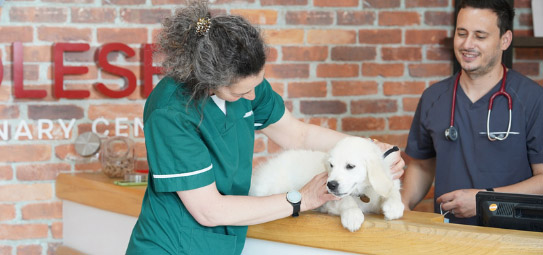
4 common types of skin problems in dogs
March 7, 2022
Approximately 21% of dogs suffer from a skin condition at some point in their lives, so it is important to know what clinical signs to look for. There are many different skin problems a dog can develop, so the symptoms may vary. However, here are some common diseases and manifestations our Vet advises you to look out for.
Book a Vet check-up
Skin conditions can be painful and uncomfortable and some can also be symptoms of a more serious health condition. We advise that the first step towards treating your dog’s skin complaint is to get them checked over by one of our experienced Vets – they can diagnose the problem and begin treatment.
Common skin problems in dogs include:
1. PARASITES
Fleas are very common and can cause itchy/sore skin and bald patches from excessive scratching. Mites and lice can cause irritation, red skin, and severe itching – mites can also burrow into the skin to lay eggs, causing mange. Mange and Fleas are treated with medication and vet-recommended shampoo. Ticks must be removed straight away as on top of causing sore skin, they can transmit Lyme disease.
2. ALLERGIES
Allergies are often from the environment or food, causing itchiness, scratching and sometimes inflammation, coughing, or sneezing. Atopy (or allergic hypersensitivity) occurs when the dog’s immune system overreacts to something that would otherwise not bother them – such as dust, pollen, grass, or flaky skin. Food allergies usually occur if the dog is allergic to certain proteins that will trigger an immune response if eaten. Mild allergies can be treated using anti-inflammatory drugs, but more severe allergies may need to be monitored more closely alongside alternative treatments or a change in diet.
Severe allergic reactions to insect stings, some poisonous plants, or toxic substances, can cause hives, rashes, or swellings anywhere on your dog’s body. A severe allergic reaction is an emergency so get in touch with our Vets asap on 01372 460107.
3. SKIN INFECTIONS
It is quite normal for bacteria and yeasts to live on a dog’s skin without causing problems. An infection can take hold if the skin is damaged, usually from scratching. A bacterial infection can cause circular red patches on the skin that often smell pungent. To diagnose the disease, a bacterial culture will be made so the corresponding antibiotic can be administered.
Yeast infections are frequently caused by allergies or overproduction of oil leading to the increase of yeast on the skin. This leads to skin thickening and crusting, a greasy coat, and a sour smell which is very unpleasant. Yeast infections are treated with prolonged medication prescribed by a Vet.
Moist dermatitis, or ‘hot spots’, can appear very quickly – they are red skin patches of infected skin that look wet and may weep. Ringworm in dogs is a fungal infection that is thankfully quite rare – it causes circular patches of red, raised, hairless, itchy skin. Skin wounds can easily become infected, besides being painful and uncomfortable.
4. HORMONAL ISSUES
The most common are Hyperthyroidism and Cushing’s disease, both causing hair loss, flaky skin, and sometimes rashes. Treatments include medication, therapy, and sometimes surgery.
Our Vets can advise you on how to treat and prevent many of the above skin complaints during a dog check-up appointment at our Claygate veterinary practice.
Book a Vet check-up





